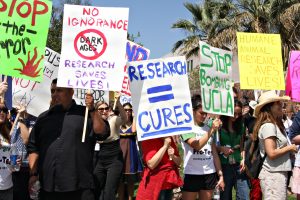Diamond Smith has struggled with excessive facial hair since the age of fifteen. She would shave her face in the morning and then notice the hair returning later in the evening. At that time, Diamond was unaware of the cause of her hair growth. Little did she know that she had a condition known as Polycystic Ovary Syndrome (PCOS). This was a disorder that caused an imbalance of hormones, and was extremely common in women. However, Diamond was unaware of this, and her self-esteem plummeted over time. After years of struggling with her hair growth, Diamond decided to seek help on a medical show called The Doctors. This was a reality show featuring a group of doctors who help find a diagnosis for patients with extreme conditions. In the episode, Diamond opens up about her personal struggles with the hair growth: “I have a beard” she says blatantly.1 Diamond explained that she gets ridiculed everyday by strangers, confessing that they even question her gender at times.

This is not uncommon for those with PCOS, as facial hair on women is still seen as a cultural taboo. Many do not understand that the excess hair growth is due to excess production of testosterone, a male hormone. A more specific explanation requires a clear understanding of PCOS. As it is an ovarian-based disease, PCOS affects a woman’s menstruation cycle and the hormones produced at that time. Normally during a women’s menstruation, a hormone known as FSH is secreted to the ovaries. This allows the eggs to mature and secrete another hormone known as estrogen, which causes the eggs to be released and either be fertilized, or shedded at the next menstruation cycle. In women with PCOS, too much estrogen is produced and causes the eggs to not mature. Instead they remain as fluid-filled sacs known as cysts, which are not shed during menstruation. This causes an array of symptoms, including irregular menstruation cycles, infertility, acne, and hirsutism (excessive hair growth). The hirsutism is caused because there is too much insulin in the blood, along with too much estrogen. The combination causes high levels of testosterone to be produced, which leads to abnormal hair growth and acn.2

Initially, the hair growth was slightly excessive, but still tolerable. Diamond would only have to shave once a week, and although people sometimes teased her, she was hardly affected by it. Once she entered her twenties, her condition worsened dramatically. Diamond began to shave daily, but her facial hair was still visible. On the show, Diamond dismally explained how she would try hair removal creams and waxing in hopes of diminishing the hair growth. Unfortunately, this did not improve her condition:”it just keeps coming back” she says on the episode. It takes three hours for Diamond to get ready for her day; she shaves her face before applying layers upon layers of foundation. Although Diamond tries her best to disguise her condition, people still notice and make rude remarks.“The amount of self-pity I put myself through every single day, it hurts,” Diamond says, as she breaks down in front of the studio audience. At this point, Diamond is still unaware that she has PCOS. In fact, Diamond believes that she caused the excessive hair growth. She wishes to have never shaved in the first place. “If I never would have shaved my face, maybe it wouldn’t have grown as bad as it did,” she says. When asked about the hardest part of her condition, Diamond said it was isolation from her family. “I want to stay home,” she says, instead of going out in public to be ridiculed.3 Diamond does not own any social media, and has isolated herself from the public because she is extremely embarrassed.
Diamond has been reluctant to receive a diagnosis in the past because she feared the results. However, she decided at twenty-three to find a proper diagnosis for her condition. In the episode, Diamond met with OBGYN specialist Dr. Nita Landry, for a consultation. Since excessive hair growth is a sign of androgen production, an ovarian-based disease was suspected. There are a few ways to diagnosis PCOS. The three defining characteristics of PCOS is hyperandrogegism (excess testosterone), irregular menstrual cycles, and having one or multiple cysts in the ovaries. Similar to Diamond, 80% of women with symptoms of excess androgen have PCOS. Since hyperandrogegism causes excessive hair growth, hirsutism is a common symptom of PCOS. Therefore PCOS can be diagnosed simply through physical appearance. The patient may have hirsutism, moderate acne, or other physical symptoms such as weight gain or hair loss. If the patient has three or more of these symptoms, they most likely have PCOS. Another method to diagnose PCOS is through a pelvic exam.A pelvic exam allows any problems with the ovaries or uterus to be detected, which is another sign of PCOS. Blood tests can be used to detect high levels of male hormones, but can also be used to check insulin and cholesterol levels.

Additionally, a more technical method for diagnosis involves an ultrasound of the ovaries. The ultrasound will reveal abnormal follicles, or cysts in the ovaries. The cysts are indicated by the large circular black dots within the ovaries. 90% of women with hirsutism are also found to have polycystic ovaries through the ultrasound. The hirsutism can be evaluated used the Ferry-man-Galley scoring system, which ranks the growth of hair between a scale 1-8.4 The intensity of PCOS can range from mild to severe. Although Diamond has a serious form of hirsutism, 50% of women with PCOS have a much less severe case. Additionally, there may be lower androgen levels, or only a few cysts in the ovaries. Nonetheless, all of these methods are effective ways to diagnose PCOS.
In the episode, Dr. Landry informed Diamond that she will do some blood work and an ultrasound to find out what’s wrong. She then asked Diamond if she had ever been depressed because of the hair growth. Diamond admitted to having depression as well having thoughts of self-harm. Diamond said how comments from other people replay in her head over and over again. Dr. Landry comforted Diamond, and assured her that there will be a solution. “Although we’re here to address the hair growth, we also need to address the emotional aspect of this,” she tells Diamond. Studies have shown a correlation between women with PCOS and mental illnesses such as depression, anxiety, and bipolar disorder. The exact cause for this is unknown, but scientists speculate that it is due to the insulin resistance and hormonal imbalance. Women with PCOS may also feel unhappy with their physical experience and have personal trouble with their femininity. This was the case for Diamond, and the cruel remarks made by strangers have severely affected her. Dr. Landry understood the emotional turmoil Diamond has been through. “At the end of the day, I want you to feel good when you look in the mirror,” she tells her.
Diamond returned to the show after a few weeks for her results. She nervously awaited her diagnosis, and sat with the rest of the doctors in front of the studio audience. Dr. Landry then explained that PCOS is the most likely condition from Diamond’s results. She assured her that Diamond did nothing to cause this and that there may be a genetic link to the disorder. Diamond then revealed how other members of her family have been struggling with this.3 Although the exact cause is unknown, there is a strong correlation between genetics and symptoms of PCOS, such as insulin resistance and hormone levels. Researchers predict that there is not a single PCOS gene, but various genes that are expressed.6 This is why PCOS has a wide range of symptoms and develops differently for each woman.7 Dr. Travis, another doctor on the panel, explained how PCOS is one of the most common endocrine disorders in women. As part of the show, Diamond was able to receive five sessions for advanced laser skin care for her hair growth. The doctors on the show also wanted to treat Diamond’s emotional turmoil, and provided her with three free sessions with a licensed therapist. Diamond expressed her gratitude on the panel. “I’m happy, I’m thankful,” she says, although she still feels incredibly insecure. “I want people to see me for me,” she pleads. The doctors on the panel comforted Diamond and certified that she would feel better soon. Although Diamond’s main concern was the excessive hair growth, there are several other risks for PCOS as well. This includes heart disease or Type 2 diabetes due to insulin resistance.8 Diamond was also appointed to meet a doctor regularly to ensure that the underlying symptoms of PCOS was also being treated.

A few months later, Diamond returned to the show with an incredible transformation. She looked stunning on stage as she greeted the doctors with a warm smile. She continued to radiate on stage. “I feel great, I feel wonderful.” It was evident how much her confidence had grown after the treatment.9 Diamond was able to remove most of her excessive hair growth through the laser treatment, but she was also prescribed the appropriate medication for the other symptoms of PCOS. While this is one way to treat PCOS, a healthy lifestyle has been shown to decrease the symptoms of PCOS significantly. Although Diamond wanted to eradicate her facial hair, other women with PCOS have grown to embrace it. This includes Harnaam Kaur, a British model and anti-bullying activist, and Annie Jones. Annie was part of Barnum & Bailey’s circus in the 1800s, and was referred to as “The Bearded Lady.” Whether women with PCOS decide to embrace their excessive hair growth or not, it is important to be mindful of how our words impact others. Hopefully, knowing the underlying causes of excessive hair growth will help us be more enlightened about this condition in the future.
- Why Am I Growing A Beard? | The Doctors, video file, 5:13, YouTube, posted 2016, https://www.youtube.com/watch?v=_Z6bL7yReJY. ↵
- Polycystic Ovary Syndrome | PCOS | Nucleus Health, video file, 5:27, YouTube, posted 2011, https://www.youtube.com/watch?v=FsNKyKS7M_s . ↵
- “Woman with Beard Gets Diagnosis,” video file, 5:09, YouTube, posted 2016, https://www.youtube.com/watch?v=0R03Xsvh6IQ. ↵
- Adam Felman, “What to know about hirsutism,” January 2019, Medical News Today (website), https://www.medicalnewstoday.com/articles/182659.php. ↵
- “Woman with Beard Gets Diagnosis,” video file, 5:09, YouTube, posted 2016, https://www.youtube.com/watch?v=0R03Xsvh6IQ. ↵
- Mohgah Elsheikh and Caroline Murphy, Polycystic Ovary Syndrome (Oxford: OUP Oxford, 2008), 20-21. ↵
- “Polycystic ovary syndrome (PCOS), Mayo Clinic (blog), https://www.mayoclinic.org/diseases-conditions/pcos/symptoms-causes/syc-20353439. ↵
- Gaber Kovacs, Polycystic Ovary Syndrome (Cambridge, UK: Cambridge University Press, 2000), 26, 44-55. ↵
- “Woman Plagued by Excessive Facial Hair Returns with an Amazing Transformation,” video file, 4:05, YouTube, posted 2017, https://www.youtube.com/watch?v=FI-k9mpBmWc&t=74s. ↵



101 comments
Hamza Bourouz
It is unfortunate that this young lady had to endure all that abuse from stranger for excessive facial hair. our societies need and should invest in more education about women’s bodies rather than imposing beauty standards that are not only unrealistic nt also harmfull to some many women and men alike. Congratulations for the author on a great piece of work, very well written and explains complex concepts in a simple way.
Paola Arellano
I really cannot imagine having to live with a condition like this. Especially in this society, I think it is very hard to be accepted and when an abnormality is added to the equation it can add a lot of emotional pain. There is a lot of help out there which makes it easier to be diagnosed and thank God for science! I’m really glad that Diamond was able to find a solution and I think it’s a lesson to stop judging people based off of their looks. She was so deprived of her own self love that I’m sure she became desperate, i hope that many more people with this condition are cured soon enough.
Maria Martinez
This was such an interesting article. I believe that it is very important that more stories like this are told in today’s society because of the social standards that have been set for women in regards to hair growth. As the article mentioned, a lot of women actually have some form of excessive hair growth and the fact that there is still so much negativity surrounding this topic is disappointing. Our society has to do a better job at making women feel more confident and able to go speak to professionals about problems they are experiencing.
Diego Terrazas
It is interesting when our body makes abnormal amounts of hormones or a substance and it greatly affects people in ways that we did not imagine were possible. An excess amount of estrogen is understandable but the spike amount of insulin I did not expect to have such an effect, granted I do not know much on the subject. I am interested in the chemical processes behind the excess production of hormones.
Mariah Garcia
Given the complex nature of the affliction discussed in this article, what really stands out is the simplicity that the author used to describe the illness. I had no knowledge of what Polycystic Ovary Syndrome was, and the way it was covered and approached made the whole concept very accessible. This was a very well written and well researched article.
Christopher Hohman
Nice article. I had no idea that excessive hair growth was a problem that may women have dealt with. To me having facial hair is very normal even though I must admit some times I do not like it much either. It must terrible for women who suffer from this disease because it leaves them feeling out of place and open to ridicule. I am glad that Diamond was able to get better and I hope that she continues to fight this condition and live a happy fulfilling life. She deserves it.
Antonio Coffee
This was a really interesting article about how some women have to deal with this condition. I had no clue that this condition even existed. Diamond is very brave for being able to go on a show and get her condition diagnosed. I would have been beyond fearful of what the diagnosis might be and would have chickened out most likely. I am glad she is getting treatment and is starting to feel better about herself. It was also really cool to learn that there are some women out there that have decided to embrace the condition.
Averie Mendez
I had no idea this condition existed prior to reading this article. It’s so interesting to know that too much estrogen + too much insulin = PCOS. I liked that you also included the science behind the diagnosis in the essay rather than merely touching on how it’s affected Diamond’s life. I can’t believe she waited so long to get a proper diagnosis, considering how rare facial hair growth in women is. I’m glad she finally got treatment and is living happily.
Nadia Carrasco
This article for sure caught me off guard. I can only imagine what Dimond Smith has to go through on her day to day life. Being a women is already tough enough in this society yet alone being a women suffering from this condition. I makes my heart happy to read that she was able to get treated although the struggles during her childhood will never be forgotten.
Danielle Slaughter
Polycystic ovarian syndrome is a difficult yet fairly common disorder. I have not been diagnosed with this disorder specifically, but I have been informed by my doctor that I do indeed grow cysts on my ovaries, so I know the stabbing pain that comes with them as well as the hormonal irregularities. All I can say is that Diamond was and is a beautiful person, despite the unwanted facial hair. I do hope that PCOS can be effectively treated for any woman that has it.